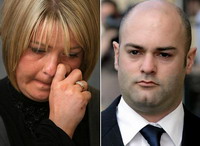Texas Supreme Court hears case of frozen embryos
Randy and Augusta Roman's divorce was proceeding normally enough. She got the house. He got the nice TV and the Honda.

It was not until the suburban Houston couple had to deal with microscopic matters that things got ugly: what to do with three frozen embryos they once hoped would bring them children.
The case of Roman vs. Roman now before the Texas Supreme Court pits her right to have children using the embryos against his right not to have children.
Augusta Roman wants to keep the embryos and try to have a baby. Randy Roman wants them destroyed, or at least kept frozen.
"These are my children," she said. "This is my last chance at being a biological mom."
Randy Roman could not be reached for comment and his attorney did not return telephone messages left at his office. In a statement of principles in his court filing, Randy Roman says he believes in the traditional nuclear family.
"Our embryos were created with the intent to be used only during the marriage between Augusta and I," the statement reads. "They were not created to be used in such a way that simply limits me to being a sperm donor, likewise they are not created to be used against my wishes."
The couple met in 1996 and were soon talking about marriage and kids. She was a nurse and he worked for a technical contractor with NASA.
They were married within six months. Augusta's biggest regret now is that she agreed to wait at least two years to have children.
When they finally tried, she got pregnant but miscarried. Unable to get pregnant again, the couple eventually sought help at a fertility clinic.
Eggs were extracted and fertilized with Randy's sperm. On April 19, 2002, the night before the eggs were to be implanted, Randy shocked her with the announcement he couldn't go through with it, giving her a list of complaints about their marriage, Augusta Roman said.
"He was telling me I was hostile to God and that he had to monitor my soul," she said. "That was traumatic. It came out of nowhere. It sounded crazy to me that he's responsible for my soul."
With their marriage dissolving, they decided to freeze the embryos while they tried to sort things out. But it wasn't long before the divorce and court battle ensued.
A Houston trial court ordered the embryos turned over to Augusta. Randy appealed and won. The case is now before the state Supreme Court, but arguments have not yet been scheduled.
A key piece of evidence is a consent form both signed on March 27, 2002, that said the embryos would be discarded in the case of divorce.
Randy argues the form is a binding contract between the couple. Augusta's attorney, Becky Reitz, says Augusta signed it with the understanding that she would get to try implantation of the embryos at least once. The only thing that stopped the process was Randy's last-minute announcement of a breakup, Reitz said.
So far, six states and the European Court of Human Rights have ruled in similar embryo custody battles. They have generally upheld the rights of the ex-spouse who does not want them used to procreate, said David Meyer, a law professor at the University of Illinois and expert in family and constitutional law.
But because such issues are still relatively new, a court may find a way to rule for the person who wants the child. "The case law is thin. The law is really still developing," Meyer said.
The consent form the Romans signed is problematic for Augusta, because courts have given such agreements significant weight in deciding previous cases.
"She has a very uphill battle to get what she wants if there is a clear agreement," Meyer said. "Courts are scratching around for some way out of these cases (and) this would give it to them."
Reitz said this case is different because Augusta has no children and no chance of getting pregnant without them. And at 45, she needs to move quickly if she wants biological children.
"This is my only chance. I am infertile. I don't have any more eggs," Augusta said.
Randy argues she could use donor eggs or adopt if she wants children. And while Augusta has agreed that she would raise the children without him, he has said he could not knowingly ignore his offspring.
A court order to discard the embryos would violate Augusta's moral beliefs. To her, it would be the same as the state forcing her to have an abortion. Reitz said she expects the case to draw support from anti-abortion groups, although none has so far filed any legal briefs to support her case.
"If I was pregnant with these embryos, no one should come and say to me abort them," Augusta said. "There is no difference between embryos inside the womb and outside the womb. I'm already pregnant. It's just implanting.
"It will never be a symbolic fight for me," Augusta said. "I'm praying the courts won't destroy my future children."
Subscribe to Pravda.Ru Telegram channel, Facebook, RSS!


